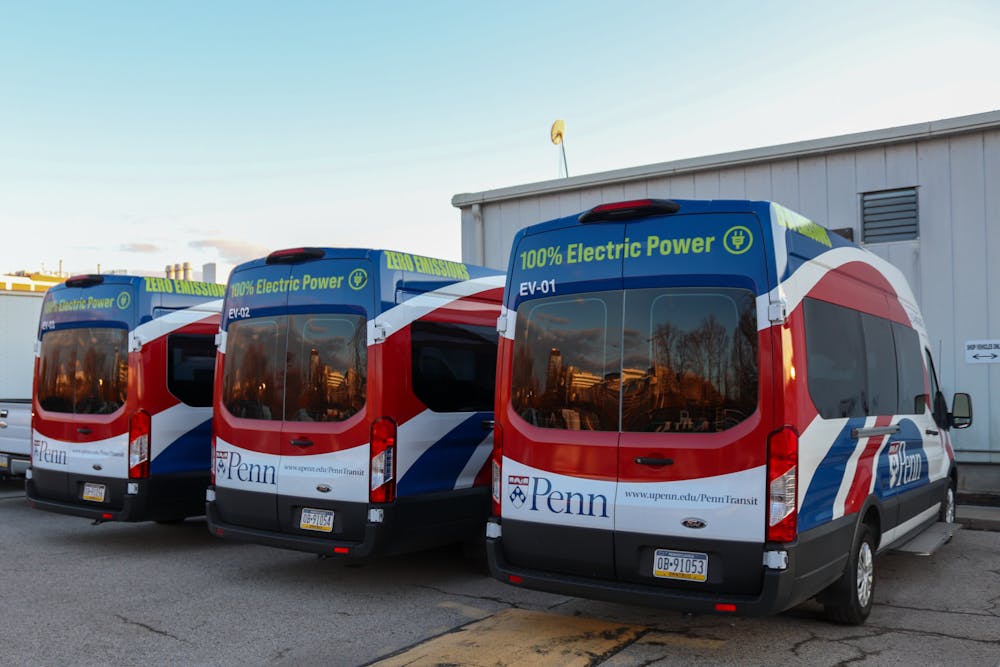
Penn Sustainability reported that the University is on track to meet the goals of its Climate and Sustainability Action Plan 3.0.
Penn is making progress on a wide range of sustainability goals for 2024, Sustainability Director Nina Morris told the University Board of Trustees in a recent update. Notable changes in the last five years include reducing carbon emissions, adding electric vehicles to Penn Transit’s fleet, and developing academic collaborations, according to Penn Today.
The University launched the original climate action plan in 2009 and has since updated its goals every five years. CSAP 3.0, which is the plan for 2019 through 2024, outlines strategies to advance environmental sustainability across areas such as academics, transportation, waste, and procurement. It also continues moving Penn toward its goal of achieving a 100 percent carbon-neutral campus by 2042.
"While the climate emergency is one of the largest challenges in front of us, here at Penn, we are uniquely positioned to bring together global and local knowledge to create a community that builds solutions together," Morris told the Board of Trustees.
Penn has reduced its carbon emissions by 46 percent since the launch of the climate action plan in 2009. According to Morris, Penn is set to surpass the United States’ target reduction in greenhouse gas pollution — a 50 percent decrease by 2030 — six years early.
Penn signed a Power Purchase agreement in 2020 for the construction of two new facilities to supply the campus with solar energy. The imminent launch of the project in January 2024 is anticipated to drive emissions down by approximately 60 percent. The replacement of 92 inefficient ultra-low temperature freezers in labs also contributed to Penn’s progress toward its goals, according to Penn Today.
In November 2022, Penn announced that it had begun purchasing carbon offsets for its air travel emissions. The Air Travel Working Group was formed to oversee the carbon offset program. Last year, Penn funded a project to capture and destroy nitrous oxide emissions at an adipic acid plant in Florida, offsetting 9,138 metric tons of carbon dioxide equivalents.
Penn Sustainability reported that the University is taking steps to meet the plan’s academic goals as well. The Environmental Innovations Initiative was established in 2020 to expand climate-related research and support faculty and students who are working to address environmental challenges.
The initiative publishes information on courses and faculty connected to sustainability, and it recently finished a report on the nature of climate and energy research across the University, according to Faculty Lead Kathleen Morrison. During the 2022 Climate Week, the EII developed Academic Climate Commitments for each of Penn's 12 schools.
Morris told Penn Today that collaboration across the University is helping it to achieve sustainability goals.
“We’re working closely with faculty to really pull the best knowledge into our practices on our campus, and students are also key to us identifying new ideas and being part of the solutions for climate,” she said.
Morris indicated a commuter survey led by PennPraxis in collaboration with other arms of the University, which revealed that 72 percent of Penn employees’ trips to work are not single-occupancy car journeys.
Penn Today highlighted several numbers reflecting the University’s commitment to sustainability. Precisely 4,886 students enrolled in environment-related courses in the 2022-23 year, and there are 35 green roofs across Penn’s nine buildings. In 2022 and 2023, Penn ranked second in the Food & Dining category in a sustainability index compiled by the Association for the Advancement of Sustainability in Higher Education.
According to Anne Papageorge, senior vice president for Facilities and Real Estate Services, discussions have started surrounding the launch of the next plan in the fall of 2024.
The Daily Pennsylvanian is an independent, student-run newspaper. Please consider making a donation to support the coverage that shapes the University. Your generosity ensures a future of strong journalism at Penn.
Donate







